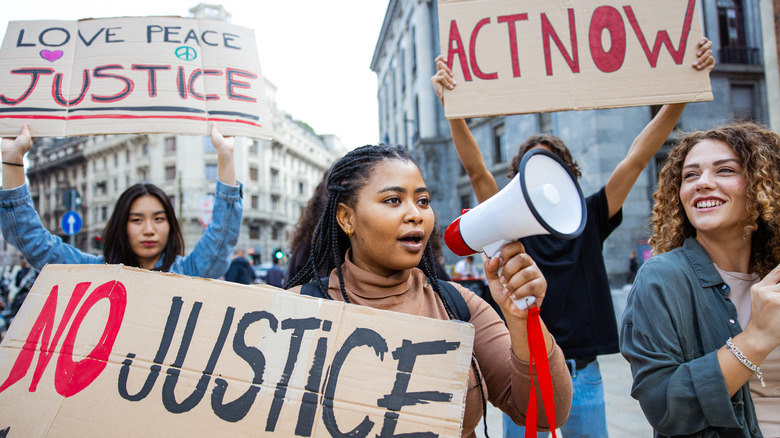Reminder: It's Important To Care For Yourself When Advocating For Others. Here's How
At a time when it seems like there are too many fires that must be immediately put out (such as the growing restrictions against reproductive rights), advocacy work can feel overwhelming. Fighting for social change isn't just physically demanding, what with the logistics involved in community building and organizing. It's also mentally and emotionally taxing.
With empathy for others at the core of activism, activists are at high risk of experiencing compassion fatigue. Prolonged exposure to others' pain and suffering makes them susceptible to vicarious trauma, and this gets compounded when their hard work seems to yield too few positive results.
Compassion fatigue is dangerous. Research shows it affects one's relationships and work and can lead to insomnia, anxiety, depression, and post-traumatic stress disorder. It also manifests as physical symptoms and can exacerbate pre-existing medical conditions. Add the opposition activists receive in the form of harassment and threats, and advocacy work can literally be life-threatening.
Although the work always feels urgent, sacrificing your well-being for the greater good is ultimately detrimental to the cause. Once you get too spent to continue, the community of support your fellow advocates contribute to and rely on gets smaller. Activist Donte Felder compared activism to a marathon, telling the National Education Association, "If you're running at top speed without a break, you're fine for the short term, but in the long run it's not so good."
Thus, self-care is a crucial practice. Advocate for your well-being as much as you do for others.
Set your limits
As passionate as you are about your cause, whether it's unionizing or protecting the environment, it shouldn't be — and it isn't — your whole life. An initiative's success or failure doesn't rest only on your shoulders; you have people to share the load with. Let this reminder relieve any guilt you might have about setting clear boundaries between your advocacy work and your personal time.
Organizing your schedule can help. Dedicate a specific number of hours a week to focusing on your activism. If being the point person is your role, establish a cut-off time for receiving and answering phone calls, messages, and emails. If possible, use a separate email account and phone number for cause-related correspondence. Inform others about your schedule, and be mindful about keeping it.
Do not hesitate to delegate when your load gets to the point where you are forced to work beyond your schedule — Asking for help doesn't make you incompetent or less dedicated. In fact, studies show that most people are happy to provide help, and your fellow activists would best understand your need for assistance. Plus, you have probably helped lighten someone's load more than a few times too.
Another important step is setting mental boundaries for yourself. Social media has made it seem as if something bad is happening 24/7, leading to doom-scrolling and heightened gloom. Limit your exposure to bad news. Schedule a designated time when you'll check online for updates, and trust that relevant news will reach you when it has to.
Manage your engagement and expectations
We tend to imagine activists as courageous individuals leading marches, sit-ins, die-ins, and giving rousing speeches to crowds. However, not everyone has the inclination or capacity to be the face and voice of a movement. When you force yourself to conform to an unattainable image, you're guaranteed to burn out quickly.
Follow what lawyer and activist Karen Walrond advised to NPR's Life Kit: " ... Clear your mind of all the things you think you should do, and instead find a safe and authentic space for the work you want to do." Instead of following a (non-existent) template for being an activist, take stock of what you can offer and work with those assets. You might be more at ease writing newsletters, articles, or designing posters for a social justice organization rather than being in a public-facing role. If you're tech-savvy, activist groups need experts to establish their online presence and keep their channels running smoothly. If social media is your thing, fight online misinformation with factual and engaging posts. Gathering signatures for petitions is also a more personal and low-key way of educating others about social issues.
In short, find your lane and stick to it. You can branch out once in a while, of course, but do not expect to achieve tremendous results immediately. Adopting a realistic perspective can keep you from spreading yourself too thin. It also protects you from getting disillusioned by the difficulty of creating effective and sustainable change.
Stay connected to your support network
Although altruism has compassion fatigue as a negative consequence, it also offers society's helpers (activists, teachers, first responders, healthcare and social workers) a positive effect: compassion satisfaction, or the fulfillment that comes from helping others. According to research, having sufficient experience with the latter helps build resilience against the former. Compassion satisfaction can be difficult to sustain, though. On top of the challenges in effecting social change, activists also endure attacks from organizations and sectors that benefit from maintaining the status quo. These range from online harassment and death threats, to accusations of domestic terrorism and physical violence. "... [Social justice activism and advocacy work] can also leave people who do this work feeling empty and powerless, and harassment and violence can leave activists feeling isolated," journalist Nylah Burton explained to Bustle.
This means that, even though they work to uplift others, activists need support just as much as (or even more than) anybody.
Don't be afraid to lean on your friends and family. Even if they're not as involved with activism as you are, they can still empathize with your pain and frustration. Let them check in on you and listen to your worries. If you want to spare them from the heaviness of your advocacy work, create an activism-free bubble instead where you can laugh or just chill in their company, and momentarily forget society's problems. Connect with them whenever you feel the stress building up to feel less alone and overwhelmed.
Honor your physical and emotional needs
It's okay to acknowledge when you need to take a break. With physical exhaustion as one of the more obvious signs of compassion fatigue, pay attention when your body tells you it needs proper nutrition and rest.
If checking in with your body doesn't come naturally, set alarms or use an app to remind you throughout the day when to take a drink of water, have a proper meal, or stretch. Schedule regular self-care breaks where you can walk around the block or even get away to spend time in nature. Whenever you feel your stress rising, use a grounding technique to calm your nerves. You can follow a guided meditation, focus on your breathing, or pay attention to your five senses. According to Psychology Today, doing this helps you be more physically present and redirects your mind from dwelling on anxiety-inducing intrusive thoughts. At night, visualize putting any pending work in a drawer and closing it shut. Treat your sleeping hours as a sacred refuge.
Honor your emotions too. You do not have to keep a stiff upper lip and pretend you don't get sad or angry about the state of the world. Feel your emotions, and find a safe outlet for them: Cry, journal, rage-clean your closet, and release your frustrations through your favorite physical activity. If you have the means, find a therapist to confide in. Talk to them even when you are not in a crisis to keep compassion fatigue at bay.
Find joy wherever you can
When we talk about caring for our mental and physical health, we usually focus on mitigating the effects of negative or traumatic experiences. But savoring the good times is part of self-care, too. With activism, finding joy builds up your compassion satisfaction, keeping your hope and altruism alive in spite of hardships.
Cherish the community and the friendships you've built through your advocacy. Celebrate even the smallest victories and take comfort in the fact that advocacy is a long game. Find peace in the thought that the hard work you've been doing will make things easier for the next generation, much like how older activists have paved the way for you. Open up to your fellow advocates and remind each other of the spark that inspired you to take action in the first place. And when someone expresses their gratitude, rather than downplay your efforts, accept their gratitude and treasure it. Use it as confirmation that you're on the right path, even though it doesn't feel that way sometimes.
Don't neglect other areas of your life that bring you joy, too. Make space for any activity that leaves you refreshed and inspired, whether it's reading, gardening, dancing, coding, cuddling with a pet or a partner, or just napping. Finding pleasure in things you enjoy isn't antithetical to advocacy work.
To borrow the words of the late great Audre Lorde, "Caring for myself is not self-indulgence, it is self-preservation, and that is an act of political warfare."





